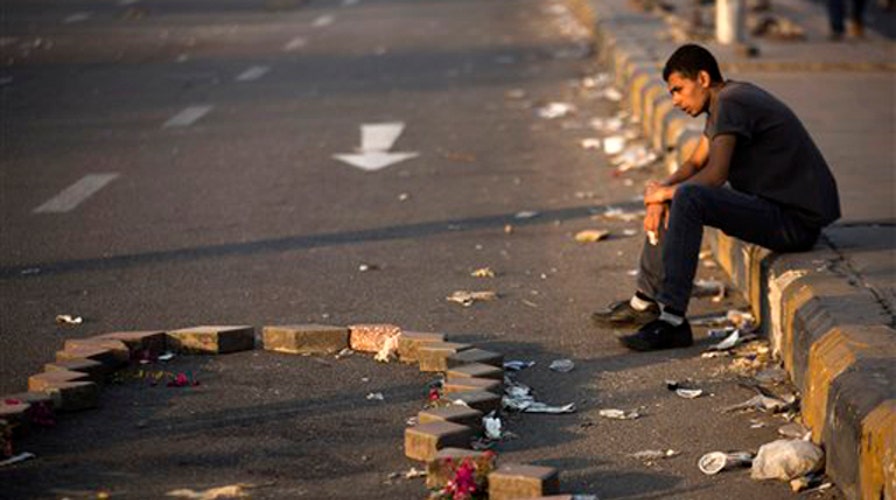Ron Paul: US money sent to Egypt has been 'wasteful'
New calls to cut aid amid unrest, violence
This is a rush transcript from "Your World," July 29, 2013. This copy may not be in its final form and may be updated.
NEIL CAVUTO, HOST: Well, here's how bad things are getting in Egypt. The more the military-led government demands protesters get off the streets, the more they fill the streets. And not even the European Union's top foreign policy official can get either side to calm down in Cairo today.
The countrywide crackdown has already left 80 Muslim Brotherhood members dead and stoked fears of yet another destabilizing revolution anew.
To Ron Paul on the phone, who says just cut the cash, and now.
Congressman, to your point, we don't know even whose to be on.
RON PAUL, R-FORMER U.S. CONGRESSMAN: That's the big problem. We never know who is in charge of anything, yet we keep sending money and sometimes we try to prop up one dictator and we lose control and we get somebody else.
So I would say it's always a bad investment. And I think all the money we have sent Egypt over the past 40 years into the many, many billions of dollars, it's really been wasteful, and now we're broke. But I don't -- one thing I don't like about foreign aid is there are conditions. Well, if you do what we say, then we will send you these weapons, but if you have an elected leader we don't like, we're not going to send them to you.
I don't like those type of conditions, because I think that foreign aid should be looked at as a principle. Do we have the right to take money from innocent American people and try to prop up different factions around the world? So I'm just opposed to foreign aid completely and universally.
CAVUTO: And I also wonder, Congressman, that the pieces are always changing, and those who get money from us kind of know the score.
The Palestinians discovered if they stopped talking about the destruction of Israel, that be would an opening point of getting some cash from us. Never mind a lot of them didn't believe that. But they ultimately started saying stuff like that to appease us and still continued their destructive ways.
You could argue in country after country, they kind of gave us lip service to whatever our interests were, but didn't follow up on them. So, where are we now?
PAUL: Well, we're in a mess. There's no incentive, because if they know there's money involved, and weapons, and all they're going to try to accommodate, and we try to buy this friendship.
But one day we're going to wake up and we're find out we are broke and nobody is taking our dollars anymore and this will all change. But we never get one side that really likes us. They like our money and that sort of thing. But I think when the time comes when we can't afford this any longer, there's going to be a lot of pent-up hostility toward us. And I worry about that to a degree, because I think it will be very, very harmful.
But there's no way we can pick and choose sides. Who -- even our administration admits they have no idea who the good guys are in Syria and we're getting -- we're sending weapons up there. So, it makes...
(CROSSTALK)
CAVUTO: Well, the argument has always been, Congressman, if we don't, the Chinese will, the Russians will, they will exert their influence. What do you say to that?
PAUL: Well, I think the Chinese are smarter than that. They have more money than we do. We have -- they're our banker now. And they're reaching out, but they're reaching out like some dirty old capitalists. They're actually investing money in Iran and Africa, places where we only send troops. So we build up hostility and we bankrupt our own country. At the same time, the Chinese keep selling us stuff, and they're hurrying up now I think to spend our money while it's still working and they're putting their investments.
So they're acting more like we did 50, 60, 70 years ago. They have sort of have taken over that role, and we're in the business of building an empire and maintaining it, and it's just going to spend up the end stages of the empire that we have. And we will have to face the facts pretty soon that this whole idea that we are motivated by selling more weapons -- and actually a lot of this foreign aid doesn't really go over there. It just goes directly to some company here in this country. They get in the money and then we send the weapons over there and then we try to manipulate their politics.
It's a bad situation. I don't know why we just couldn't say, what was the advice of the founders? They said, stay out of the entangling alliances of all nations. Mainly, they wanted us to stay out of Europe, but I think that should apply certainly not only to Europe and Korea, but the Middle East as well. I think the world would be better off for it.
CAVUTO: Well, there is another old expression, good money after bad.
But, Congressman, always good having you on, sir. Thank you.
PAUL: Thank, Neil.
Content and Programming Copyright 2013 Fox News Network, LLC. ALL RIGHTS RESERVED. Copyright 2013 CQ-Roll Call, Inc. All materials herein are protected by United States copyright law and may not be reproduced, distributed, transmitted, displayed, published or broadcast without the prior written permission of CQ-Roll Call. You may not alter or remove any trademark, copyright or other notice from copies of the content.

